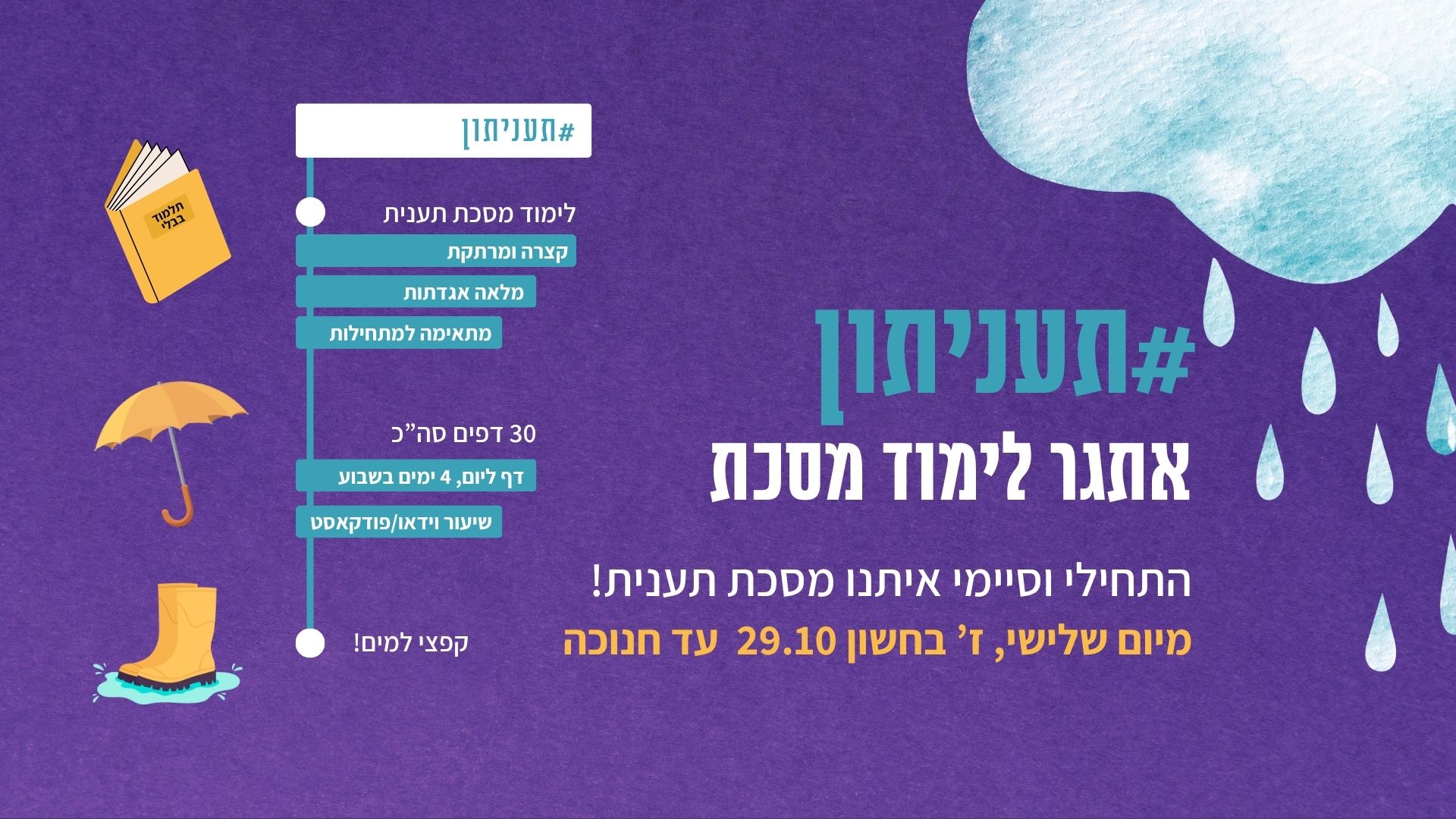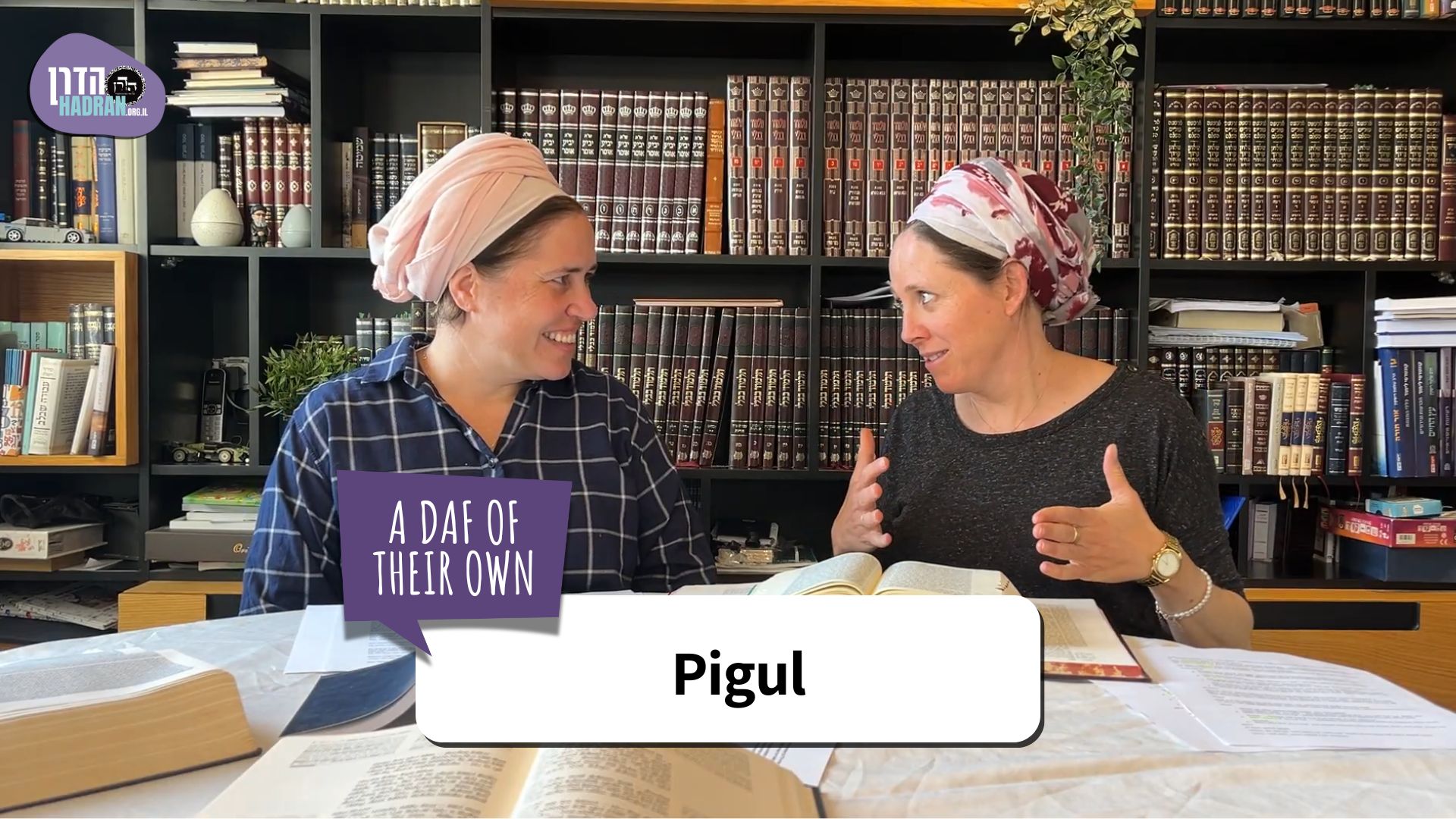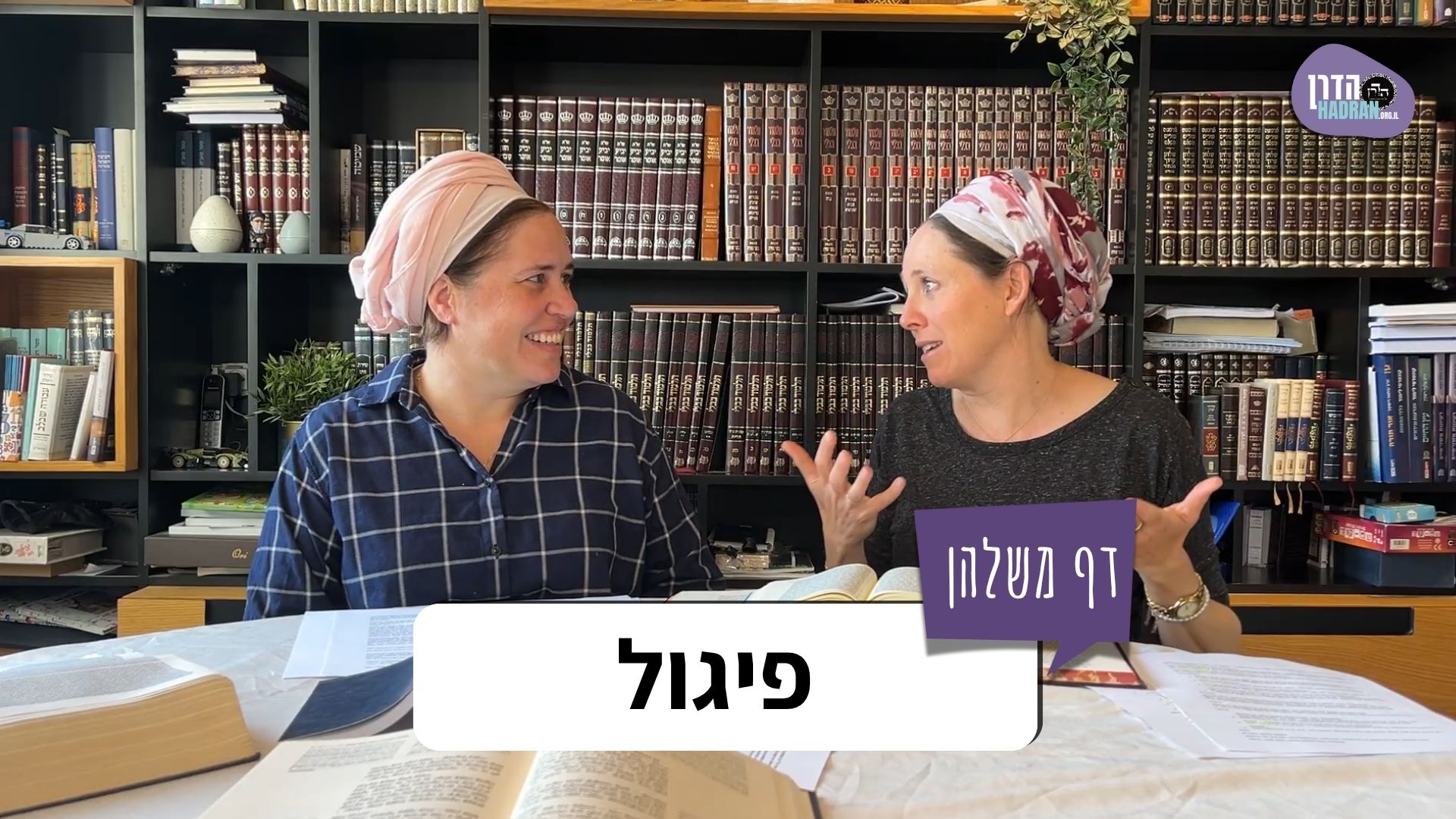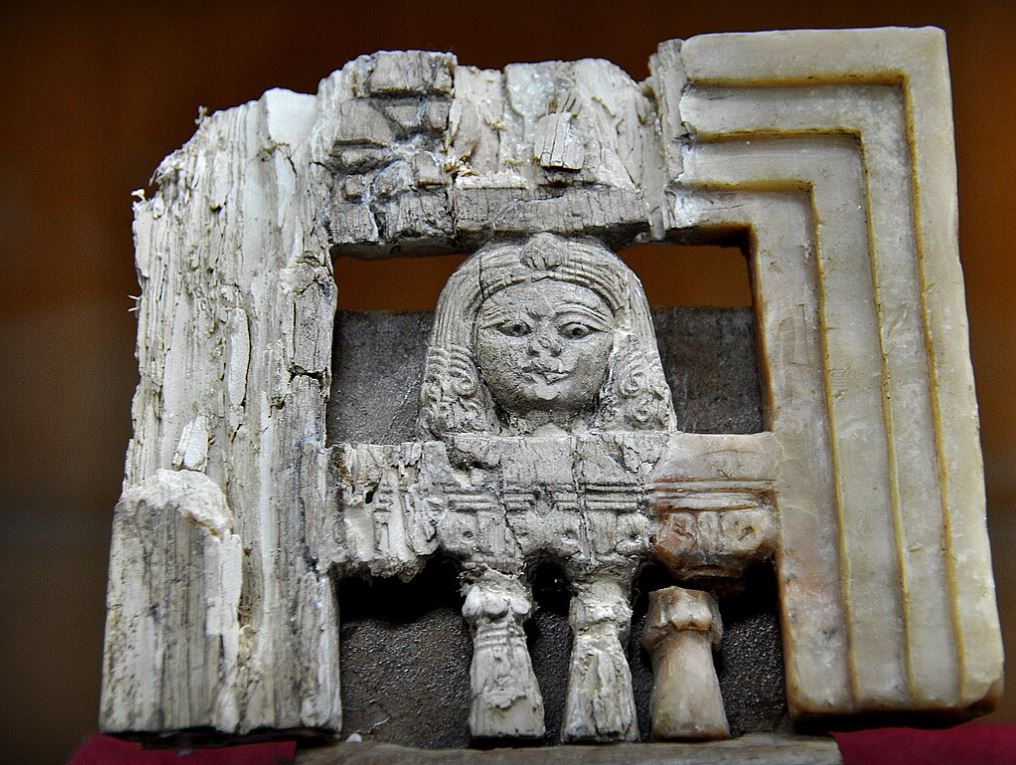Makkot 17
קוֹרֵא אֶת הַשֵּׁם, וְאֵינוֹ צָרִיךְ לְהַפְרִישׁ.
He designates a portion of the produce by means of calling the name upon poor man’s tithe, but he is not required to physically separate that portion and give it to the poor.
מַאי לָאו בְּהָא קָא מִיפַּלְגִי, דְּמָר סָבַר: וַדַּאי – טוֹבְלוֹ. וּמָר סָבַר: וַדַּאי – אֵינוֹ טוֹבְלוֹ? אֲמַר לֵיהּ אַבָּיֵי: אִי הָכִי, אַדְּמִיפַּלְגִי בִּסְפֵיקוֹ, לִיפַּלְגוּ בְּוַדַּאי!
Rav Yosef suggests: What, is it not that they disagree with regard to this: That one Sage, the Rabbis, holds that produce from which poor man’s tithe was certainly not separated is rendered untithed produce, and therefore, in a case where there is uncertainty whether poor man’s tithe was separated, one is required to separate it; and one Sage, Rabbi Eliezer, holds that produce from which poor man’s tithe was certainly not separated is not rendered untithed produce, and therefore, one need not even designate poor man’s tithe by calling its name upon a portion of the produce? Abaye said to Rav Yosef: If it is so, that this is the point in dispute, rather than disagreeing with regard to a case of uncertainty whether poor man’s tithe was separated, let them disagree with regard to a case of certainty that poor man’s tithe was not separated.
אֶלָּא, דְּכוּלֵּי עָלְמָא וַדַּאי – טוֹבְלוֹ. וְהָכָא בְּהָא קָא מִיפַּלְגִי, מָר סָבַר: לֹא נֶחְשְׁדוּ עַמֵּי הָאָרֶץ עַל מַעְשַׂר עָנִי שֶׁל דְּמַאי. כֵּיוָן דְּמָמוֹנָא הוּא – אַפְרוֹשֵׁי מַפְרֵישׁ. וְרַבָּנַן סָבְרִי: כֵּיוָן דִּטְרִיחָא לֵיהּ מִילְּתָא – לָא מַפְרֵישׁ.
Rather, contrary to the previous suggestion, say that everyone agrees that produce from which poor man’s tithe was certainly not separated is rendered untithed produce. And here, it is with regard to this that they disagree: One Sage, Rabbi Eliezer, holds: Amei ha’aretz are not suspected of refraining from separating poor man’s tithe of demai. Since it is merely a matter of money, and no sanctity is involved, he separates poor man’s tithe, although he does not actually give it to the poor. And the Rabbis hold: Since the matter involves exertion for him, he does not even separate poor man’s tithe.
כַּמָּה יֹאכַל מִן הַטֶּבֶל וְכוּ׳: אָמַר רַב בִּיבִי אָמַר רַבִּי שִׁמְעוֹן בֶּן לָקִישׁ: מַחְלוֹקֶת בְּחִטָּה, אֲבָל בְּקֶמַח – דִּבְרֵי הַכֹּל כְּזַיִת. וְרַבִּי יִרְמְיָה אָמַר רַבִּי שִׁמְעוֹן בֶּן לָקִישׁ: כְּמַחְלוֹקֶת בָּזוֹ כָּךְ מַחְלוֹקֶת בָּזוֹ.
§ The mishna teaches: How much does one need to eat from untithed produce and be liable to receive lashes? Rabbi Shimon says: Even if one ate any amount of untithed produce he is liable to receive lashes. And the Rabbis say: He is liable only if he eats an olive-bulk. Rav Beivai says that Rabbi Shimon ben Lakish says: Their dispute is with regard to one who eats one kernel of wheat of untithed produce. But with regard to flour, everyone agrees that one is liable only if he eats an olive-bulk. And Rabbi Yirmeya says that Rabbi Shimon ben Lakish says: Just as there is a dispute with regard to this case of a kernel of wheat, so too, there is a dispute with regard to that case of flour.
תְּנַן, אָמַר לָהֶם רַבִּי שִׁמְעוֹן: אִי אַתֶּם מוֹדִים לִי בְּאוֹכֵל נְמָלָה כׇּל שֶׁהוּא שֶׁהוּא חַיָּיב? אָמְרוּ לוֹ: מִפְּנֵי שֶׁהִיא כִּבְרִיָּיתָהּ. אָמַר לָהֶן: אַף חִטָּה אַחַת כִּבְרִיָּיתָהּ. חִטָּה – אִין, קֶמַח – לָא!
The Gemara cites proof from that which we learned in the mishna: Rabbi Shimon said to them: Do you not concede to me with regard to one who eats an ant of any size that he is liable to receive lashes? The Rabbis said to Rabbi Shimon: He is flogged for eating an ant of any size due to the fact that it is an intact entity in the form of its creation. Rabbi Shimon said to them: One kernel of wheat is also in the form of its creation. The Gemara infers from Rabbi Shimon’s response: For a kernel of wheat, yes, one is liable; for any amount of flour, no, one is not liable. Apparently, even Rabbi Shimon concedes that one is liable for eating only an olive-bulk of wheat flour, in accordance with the statement that Rav Beivai says that Rabbi Shimon ben Lakish says.
לְדִבְרֵיהֶם קָאָמַר לְהוּ: לְדִידִי – אֲפִילּוּ קֶמַח נָמֵי, אֶלָּא לְדִידְכוּ – אוֹדוֹ לִי מִיהַת דְּחִטָּה אַחַת כִּבְרִיָּיתָהּ. וְרַבָּנַן: בְּרִיַּית נְשָׁמָה – חֲשִׁובָה, חִטָּה – לָא חֲשִׁובָה. תַּנְיָא כְּוָתֵיהּ דְּרַבִּי יִרְמְיָה, רַבִּי שִׁמְעוֹן אוֹמֵר: כׇּל שֶׁהוּא לְמַכּוֹת, לֹא אָמְרוּ כְּזַיִת אֶלָּא לְעִנְיַן קׇרְבָּן.
The Gemara answers: It is in accordance with the statement of the Rabbis that Rabbi Shimon spoke to them, and he meant as follows: According to my opinion, even if one ate any amount of flour he is also liable. But according to your opinion, concede to me at least that one is liable if he eats one kernel of wheat, as it is in the form of its creation. And the Rabbis say in response: There is a difference; an entity with a soul, i.e., a living creature, is significant, and one is liable for eating an entity of any volume. A kernel of wheat is not significant. The Gemara notes: It is taught in a baraita in accordance with the opinion of Rabbi Yirmeya, that Rabbi Shimon says: One who eats any amount of food that is forbidden is liable to receive lashes; the Sages said the measure of an olive-bulk only with regard to liability to bring a sin-offering for one who unwittingly ate forbidden food.
מַתְנִי׳ הָאוֹכֵל בִּכּוּרִים עַד שֶׁלֹּא קָרָא עֲלֵיהֶם, קׇדְשֵׁי קָדָשִׁים חוּץ לַקְּלָעִים, קָדָשִׁים קַלִּים וּמַעֲשֵׂר שֵׁנִי חוּץ לַחוֹמָה. הַשּׁוֹבֵר אֶת הָעֶצֶם בַּפֶּסַח הַטָּהוֹר – הֲרֵי זֶה לוֹקֶה אַרְבָּעִים. אֲבָל הַמּוֹתִיר בַּטָּהוֹר וְהַשּׁוֹבֵר בַּטָּמֵא – אֵינוֹ לוֹקֶה אַרְבָּעִים.
MISHNA: In the case of a priest who eats first fruits before the one who brought the fruits to the Temple recited over those fruits the Torah verses that he is obligated to recite (see Deuteronomy 26:3–10); and one who ate offerings of the most sacred order outside the curtains surrounding the Tabernacle courtyard, or outside the Temple courtyard; and one who ate offerings of lesser sanctity or second-tithe produce outside the wall of Jerusalem; and also one who breaks the bone of a ritually pure Paschal offering; in all these cases he is flogged with forty lashes. But one who leaves the flesh of the ritually pure Paschal offering until the morning of the fifteenth of Nisan, and one who breaks a bone of a ritually impure Paschal offering, is not flogged with forty lashes.
הַנּוֹטֵל אֵם עַל הַבָּנִים, רַבִּי יְהוּדָה אוֹמֵר: לוֹקֶה וְאֵינוֹ מְשַׁלֵּחַ. וַחֲכָמִים אוֹמְרִים: מְשַׁלֵּחַ וְאֵינוֹ לוֹקֶה. זֶה הַכְּלָל: כׇּל מִצְוַת לֹא תַעֲשֶׂה שֶׁיֵּשׁ בָּהּ קוּם עֲשֵׂה – אֵין חַיָּיבִין עָלֶיהָ.
With regard to one who takes the mother bird with her fledglings, thereby violating the Torah prohibition: “You shall not take the mother with her fledglings; you shall send the mother, and the fledglings you may take for yourself” (Deuteronomy 22:6–7), Rabbi Yehuda says: He is flogged for taking the mother bird, and does not send the mother, and the Rabbis say: He sends the mother and is not flogged, as this is the principle: With regard to any prohibition that entails a command to arise and perform a mitzva, he is not liable to receive lashes for its violation.
גְּמָ׳ אָמַר רַבָּה בַּר בַּר חָנָה אָמַר רַבִּי יוֹחָנָן: זוֹ דִּבְרֵי רַבִּי עֲקִיבָא סְתִימְתָּאָה, אֲבָל חֲכָמִים אוֹמְרִים: בִּכּוּרִים – הַנָּחָה מְעַכֶּבֶת בָּהֶן, קְרִיאָה אֵין מְעַכֶּבֶת בָּהֶן.
GEMARA: The mishna teaches that a priest who eats first fruits before the one who brought the fruits to the Temple recited the accompanying Torah verses is liable to receive lashes. With regard to this statement, Rabba bar bar Ḥana says that Rabbi Yoḥanan says: This is the statement of Rabbi Akiva, whose statements are often cited in the mishna unattributed. But the Rabbis say: With regard to first fruits, the lack of placement alongside the altar invalidates them, and they may not be eaten; but the lack of recitation of the accompanying Torah verses does not invalidate them, and if one placed them and did not recite the accompanying Torah verses, the priest who eats them is not flogged.
וְלֵימָא זוֹ דִּבְרֵי רַבִּי שִׁמְעוֹן סְתִימְתָּאָה! הָא קָא מַשְׁמַע לַן דְּרַבִּי עֲקִיבָא כְּרַבִּי שִׁמְעוֹן סְבִירָא לֵיהּ.
The Gemara suggests: And let Rabbi Yoḥanan say: This statement in the mishna is the unattributed statement of Rabbi Shimon, who stated this halakha explicitly, rather than attributing the statement to Rabbi Akiva, whose statement was not explicit. The Gemara answers: This teaches us that although he did not say so explicitly, Rabbi Akiva holds in accordance with the opinion of Rabbi Shimon.
מַאי רַבִּי שִׁמְעוֹן? דְּתַנְיָא: ״וּתְרוּמַת יָדֶךָ״ – אֵלּוּ בִּכּוּרִים.
What is the statement of Rabbi Shimon? It is as it is taught in a baraita with regard to food items that may not be eaten outside the walls of Jerusalem. It is written: “You may not eat within your gates the tithe of your grain, or of your wine, or of your oil, or the firstborn of your herd or of your flock, nor any of your vows that you vow, nor your gift offerings, nor the donation of your hand” (Deuteronomy 12:17). The Sages explain that with regard to the phrase “nor the donation of [terumat] your hand,” these are first fruits.
אָמַר רַבִּי שִׁמְעוֹן: מָה בָּא זֶה לְלַמְּדֵנוּ? אִם לְאוֹכְלָן חוּץ לַחוֹמָה – קַל וָחוֹמֶר מִמַּעֲשֵׂר הַקַּל: וּמָה מַעֲשֵׂר הַקַּל, אוֹכְלָן חוּץ לַחוֹמָה לוֹקֶה – בִּכּוּרִים לֹא כׇּל שֶׁכֵּן? הָא לֹא בָּא הַכָּתוּב אֶלָּא לָאוֹכֵל מִבִּכּוּרִים עַד שֶׁלֹּא קָרָא עֲלֵיהֶם, שֶׁהוּא לוֹקֶה.
Rabbi Shimon said: What does this phrase come to teach us? If it is to teach the prohibition to eat the first fruits outside the wall of Jerusalem, there is no need for a verse, as it may be derived by means of an a fortiori inference from the lenient case of second-tithe produce. If with regard to the lenient case of second-tithe produce, one who eats them outside the wall is flogged, then with regard to first fruits, all the more so is it not clear that he is flogged? Rather, the verse comes to teach only with regard to a priest who partakes of first fruits before the person who brought the fruits to the Temple recited the accompanying Torah verses over them, teaching that he is flogged.
״וְנִדְבֹתֶיךָ״ – זוֹ תּוֹדָה וּשְׁלָמִים. אָמַר רַבִּי שִׁמְעוֹן: מָה בָּא זֶה לְלַמְּדֵנוּ? אִם לְאוֹכְלָן חוּץ לַחוֹמָה – קַל וָחוֹמֶר מִמַּעֲשֵׂר, הָא לֹא בָּא הַכָּתוּב אֶלָּא לָאוֹכֵל בְּתוֹדָה וּבִשְׁלָמִים לִפְנֵי זְרִיקָה, שֶׁהוּא לוֹקֶה.
The baraita continues: “Nor your gift offerings”; this is a thanks-offering and a peace-offering that one donates voluntarily. Rabbi Shimon says: What does this phrase come to teach us? If it is to teach that it is prohibited to eat a thanks-offering and a peace-offering outside the wall of Jerusalem, there is no need for a verse, as it may be derived by means of an a fortiori inference from the case of second-tithe produce, for whose consumption outside the wall one is flogged, despite the fact that it is not an offering. Rather, the verse comes to teach only with regard to one who partakes of a thanks-offering or of a peace-offering before the sprinkling of its blood on the altar, before the consumption of its flesh is permitted, that he is flogged.
״וּבְכֹרֹת״ – זֶה הַבְּכוֹר. אָמַר רַבִּי שִׁמְעוֹן: מָה בָּא זֶה לְלַמְּדֵנוּ? אִם לְאוֹכְלָן חוּץ לַחוֹמָה – קַל וָחוֹמֶר מִמַּעֲשֵׂר, אִם לִפְנֵי זְרִיקָה – קַל וָחוֹמֶר מִתּוֹדָה וּשְׁלָמִים! הָא לֹא בָּא הַכָּתוּב אֶלָּא לָאוֹכֵל מִן הַבְּכוֹר אֲפִילּוּ לְאַחַר זְרִיקָה, שֶׁהוּא לוֹקֶה.
The baraita continues: “Or the firstborn”; this is the firstborn. Rabbi Shimon says: What does this verse come to teach us? If it is to teach that it is prohibited to eat a firstborn animal outside the wall of Jerusalem, there is no need for a verse, as it may be derived by means of an a fortiori inference from the case of second-tithe produce. If it is to teach that it is prohibited to eat a firstborn animal before the sprinkling of the blood, it may be derived by means of an a fortiori inference from the case of a thanks-offering and a peace-offering, which are offerings of lesser sanctity, as even non-priests may partake of their flesh. Rather, the verse comes to teach only with regard to a non-priest who partakes of the flesh of a firstborn even after the sprinkling of its blood, that he is flogged.
״בְּקָרְךָ וְצֹאנֶךָ״ – זוֹ חַטָּאת וְאָשָׁם. אָמַר רַבִּי שִׁמְעוֹן: מָה בָּא זֶה לְלַמְּדֵנוּ?
The baraita continues: “Of your herd or of your flock”; this is a sin-offering and a guilt-offering, which are offerings of the most sacred order, which may be eaten only within the Temple courtyard. Rabbi Shimon says: What does this verse come to teach us?
אִם לְאוֹכְלָן חוּץ לַחוֹמָה – קַל וָחוֹמֶר מִמַּעֲשֵׂר, אִם לִפְנֵי זְרִיקָה – קַל וָחוֹמֶר מִתּוֹדָה וּשְׁלָמִים, אִם לְאַחַר זְרִיקָה – קַל וָחוֹמֶר מִבְּכוֹר! הָא לֹא בָּא הַכָּתוּב אֶלָּא לָאוֹכֵל מֵחַטָּאת וְאָשָׁם אֲפִילּוּ לְאַחַר זְרִיקָה חוּץ לַקְּלָעִים, שֶׁהוּא לוֹקֶה.
If it is to teach that it is prohibited to eat a sin-offering and a guilt-offering outside the wall, there is no need for a verse, as it may be derived by means of an a fortiori inference from the case of second-tithe produce. If it is to teach that it is prohibited to eat a sin-offering and a guilt-offering before the sprinkling of the blood, it may be derived by means of an a fortiori inference from the case of a thanks-offering and a peace-offering, which are offerings of lesser sanctity. If it is to teach that it is prohibited for a non-priest to eat a sin-offering and a guilt-offering after the sprinkling of its blood, it may be derived by means of an a fortiori inference from the case of a firstborn animal. Rather, the verse comes to teach only with regard to one who partakes of the flesh of a sin-offering or a guilt-offering even after the sprinkling of its blood, which is the correct time to partake of it, but he partakes of it outside the curtains surrounding the Tabernacle courtyard or outside the Temple courtyard, that he is flogged.
״נְדָרֶיךָ״ – זוֹ עוֹלָה. אָמַר רַבִּי שִׁמְעוֹן: מָה בָּא זֶה לְלַמְּדֵנוּ?
The baraita continues: “Your vows”; this is the burnt-offering, which is an offering of the most sacred order and is entirely consumed upon the altar, and is brought as a gift offering, not as an obligation. Rabbi Shimon says: What does this verse come to teach us?
אִם לְאוֹכְלָן חוּץ לַחוֹמָה – קַל וָחוֹמֶר מִמַּעֲשֵׂר, אִם לִפְנֵי זְרִיקָה – קַל וָחוֹמֶר מִתּוֹדָה וּשְׁלָמִים, אִם לְאַחַר זְרִיקָה – קַל וָחוֹמֶר מִבְּכוֹר, אִם חוּץ לַקְּלָעִים – קַל וָחוֹמֶר מֵחַטָּאת וְאָשָׁם! הָא לֹא בָּא הַכָּתוּב
If it is to teach that it is prohibited to eat a burnt-offering outside the wall of Jerusalem, there is no need for a verse, as it may be derived by means of an a fortiori inference from the case of second-tithe produce. If it is to teach that it is prohibited to eat a burnt-offering before the sprinkling of the blood, it may be derived by means of an a fortiori inference from the case of a thanks-offering and a peace-offering, which are offerings of lesser sanctity. If it is to teach that it is prohibited for a non-priest to eat a sin-offering and a guilt-offering after the sprinkling of its blood, it may be derived by means of an a fortiori inference from the case of a firstborn animal. If it is to teach that it is prohibited to eat a burnt-offering outside the curtains surrounding the Tabernacle courtyard or outside the Temple courtyard there is an a fortiori inference from a sin-offering and a guilt-offering. Rather, the verse comes
אֶלָּא לָאוֹכֵל מִן הָעוֹלָה לְאַחַר זְרִיקָה, אֲפִילּוּ בִּפְנִים, שֶׁהוּא לוֹקֶה.
to teach only with regard to one who partakes of the flesh of a burnt-offering after the sprinkling, even inside the courtyard, that he is flogged.
אָמַר רָבָא: דְּיָלְידָא אִימֵּיהּ כְּרַבִּי שִׁמְעוֹן – תֵּילִיד, וְאִי לָא – לָא תֵּילִיד. וְאַף עַל גַּב דְּאִית לְהוּ פִּירְכָא.
Rava says with regard to Rabbi Shimon’s statement in the baraita: With regard to anyone whose mother is bearing a child who is like Rabbi Shimon, she should bear that child, and if not, it is preferable that she does not bear him at all. Rava was so impressed by Rabbi Shimon’s statement that he praised him and characterized him as the model of a wise man. Rava added: And I say this even though there is a refutation for each of his conclusions. What are the refutations?
מַאי חוּמְרָא דְּבִכּוּרִים מִמַּעֲשֵׂר – שֶׁכֵּן אֲסוּרִים לְזָרִים. אַדְּרַבָּה, מַעֲשֵׂר חָמוּר, שֶׁכֵּן אָסוּר לְאוֹנֵן.
What is the stringency of first fruits vis-à-vis second-tithe produce? It is that first fruits are forbidden to non-priests, who are permitted to eat second-tithe produce. That can be refuted; on the contrary, second-tithe produce is more stringent than first fruits, in that it is forbidden to an acute mourner, i.e., one whose close relative died that day, which is not the case with regard to first fruits according to the opinion of Rabbi Shimon (see Yevamot 73b).
וּמַאי חוּמְרָא דְּתוֹדָה וּשְׁלָמִים מִמַּעֲשֵׂר – שֶׁכֵּן טְעוּנִין מַתַּן דָּמִים וְאֵימוּרִין לְגַבֵּי מִזְבֵּחַ. אַדְּרַבָּה, מַעֲשֵׂר חָמוּר, שֶׁכֵּן טְעוּנִין כֶּסֶף צוּרָה.
And what is the stringency of a thanks-offering and a peace-offering vis-à-vis second-tithe produce? It is that the thanks-offering and the peace-offering require the placement of blood and sacrificial portions upon the altar. That can be refuted; on the contrary, second-tithe produce is more stringent than the thanks-offering and the peace-offering, in that the redemption of second-tithe produce requires money minted into a coin. A disqualified thanks-offering and peace-offering, like other disqualified offerings, may be redeemed with any object of equal value.
וּמַאי חוּמְרָא דִּבְכוֹר מִתּוֹדָה וּשְׁלָמִים – שֶׁכֵּן קְדוּשָּׁתוֹ מֵרֶחֶם. אַדְּרַבָּה: תּוֹדָה וּשְׁלָמִים חֲמוּרִים, שֶׁכֵּן טְעוּנִים סְמִיכָה, וּנְסָכִים, וּתְנוּפַת חָזֶה וָשׁוֹק.
And what is the stringency of a firstborn offering vis-à-vis a thanks-offering and a peace-offering? It is that the sanctity of the firstborn takes effect from the womb, while the other offerings are consecrated by their owners. That can be refuted; on the contrary, a thanks-offering and a peace-offering are more stringent, in that they require placing hands on the head of the offering before its sacrifice, and libations, and the waving of the breast and the thigh, which is not the case with regard to a firstborn offering.
וּמַאי חוּמְרָא דְּחַטָּאת וְאָשָׁם מִבְּכוֹר – שֶׁכֵּן קׇדְשֵׁי קָדָשִׁים. אַדְּרַבָּה, בְּכוֹר חָמוּר, שֶׁכֵּן קְדוּשָּׁתוֹ מֵרֶחֶם.
And what is the stringency of a sin-offering and a guilt-offering vis-à-vis a firstborn offering? It is that a sin-offering and a guilt-offering are offerings of the most sacred order. That can be refuted; on the contrary, a firstborn offering is more stringent, in that its sanctity takes effect from the womb, not from consecration by its owner.
וּמַאי חוּמְרָא דְּעוֹלָה מֵחַטָּאת וְאָשָׁם – שֶׁכֵּן כָּלִיל. אַדְּרַבָּה, חַטָּאת וְאָשָׁם חֲמִירִי, שֶׁכֵּן מְכַפְּרִי.
And what is the stringency of the burnt-offering vis-à-vis a sin-offering and a guilt-offering? It is that it is burnt in its entirety upon the altar, and no part of it is given to the priests. That can be refuted; on the contrary, the sin-offering and the guilt-offering are more stringent, in that they atone for one’s sins, and a burnt-offering is brought as a gift offering.
וְכוּלְּהוּ חֲמִירִי מֵעוֹלָה, דְּאִית בְּהוּ שְׁתֵּי אֲכִילוֹת!
And all of those matters listed in the baraita are more stringent than the burnt-offering because there are two consumptions with regard to each of these matters, as they are consumed upon the altar and consumed by their owner and the priests, whereas the burnt-offering is consumed in its entirety upon the altar.
אֶלָּא מַאי דְּיָלְידָא אִימֵּיהּ כְּרַבִּי שִׁמְעוֹן? דִּלְמַאי דִּסְבִירָא לֵיהּ לְדִידֵיהּ, מְסָרֵס לֵיהּ לִקְרָא וְדָרֵישׁ לֵיהּ.
The Gemara asks: Rather, what is the meaning of this statement of praise: With regard to anyone whose mother is bearing a child who is like Rabbi Shimon, she should bear that child, and if not, it is preferable if she does not bear him at all? Ultimately, all of his derivations can be refuted. The Gemara answers: The praise is based on the fact that in order to arrive at what he himself holds, he transposes the verse and interprets it. Rabbi Shimon does not interpret the verse from beginning to end; rather, he begins with the final case of first fruits, in order to arrive at the desired conclusion. Rava was impressed with Rabbi Shimon’s interpretation.
וְכִי מַזְהִירִין מִן הַדִּין? הָא אֲפִילּוּ לְמַאן דְּאָמַר עוֹנְשִׁין מִן הַדִּין, אֵין מַזְהִירִין מִן הַדִּין! אִיסּוּרָא בְּעָלְמָא.
The Gemara asks with regard to Rabbi Shimon, who derived prohibitions not written in the Torah by means of a fortiori inferences: And does one derive a prohibition from an a fortiori inference? But even according to the one who says that if there is a prohibition written explicitly in the Torah, one administers punishment based on an a fortiori inference, one does not derive a prohibition from an a fortiori inference. The Gemara answers: Rabbi Shimon does not derive prohibitions for which one is flogged from those inferences; rather, he derives a mere prohibition.
וְהָאָמַר רָבָא: זָר שֶׁאָכַל מִן הָעוֹלָה לִפְנֵי זְרִיקָה חוּץ לַחוֹמָה, לְרַבִּי שִׁמְעוֹן לוֹקֶה חָמֵשׁ! חֲמִשָּׁה אִיסּוּרִין הָווּ.
The Gemara asks: But doesn’t Rava say: With regard to a non-priest who ate the flesh of a burnt-offering before sprinkling its blood, outside the walls, according to Rabbi Shimon he is flogged with five sets of lashes: One because he is a non-priest; one for eating a burnt-offering; one for eating the flesh of an offering before its blood was sprinkled; one for eating offerings of the most sacred order outside the Temple courtyard; and one for eating sacrificial food outside of Jerusalem. Apparently, Rabbi Shimon holds that all these are actual prohibitions for which one is flogged. The Gemara answers: It does not mean that one is actually flogged; rather, it means that they are five prohibitions.
וְהָא אֲנַן תְּנַן: אֵלּוּ הֵן הַלּוֹקִין!
The Gemara asks: But didn’t we learn in the mishna: And these are the people who are flogged by Torah law? Among them is a priest who eats first fruits before the recitation of the accompanying Torah verses, and the Gemara established that the mishna is in accordance with the opinion of Rabbi Shimon.
































